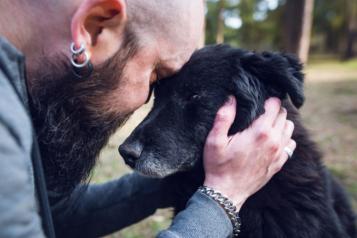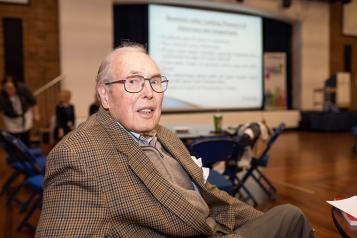Playing the part in improving older people's care
The play was performed last Friday in Huntingdon, with an audience made up of members of the public, frontline health and care staff, and some of the people who make decisions about older people’s services.
They watched Phyllis, 80, and her family navigate the complex system of older people’s care. Phyllis was managing at home with the help of her family. On one of her daily trips to the shops, she fell and ended up in hospital.
Her family rushed around to support her, but the days became weeks. They were followed by ‘step down beds’ – who knows what they are? The family started to struggle. They struggled to understand what was happening with Phyllis’ care and who to talk to about it.
The play was both funny and sad, with nuanced performances by the four-person cast. We saw how family members and carers are people with complex lives and other responsibilities. They don’t know how the health and care systems connect or who to talk to, to get the answers.
Phyllis was developed by Women & Theatre from research with patients, family members, health and social care professionals, and it highlights the challenges many face.
What the audience said
One audience member told us ‘Mum went through all those processes and that was quite difficult to watch actually. It’s upsetting that it’s repeated everywhere, that’s the tragedy.'
There were conversations about how the current system for older people is so fragmented. Charlotte Black, Service Director of Adults & Safeguarding at Cambridgeshire County Council, said that they are now basing staff in hospitals to help people co-ordinate care as they know how hard it can be.
The group talked about the challenges of the language used to describe different bits of the system, and how people don’t always know who to talk to for help. As one person put it, ‘You don’t know what you don’t know. When you are in hospital, you are already under pressure anyway, but then you cannot get hold of anybody.’
Helping people get home
There’s lots of evidence to show that the longer a frail elderly person stays in hospital when they don’t need to be there, the more strength and condition they lose. Someone who once lived independently may never be strong enough to live independently again.
There were long conversations about preventing falls and tackling isolation for older people. How it’s important for older people to keep connected to those around them, but with the challenges of public transport and modern lives, this isn’t always easy.
End of life care
Janice, who plays Phyllis said,
‘We need to embed talking about death and end of life care earlier on. How do we have those conversations about the end of life and death? ‘
‘It is a very special time at the end of our lives, this person isn’t going to be there for a lot longer. It is getting the balance right.’
Why we brought Phyllis to Cambridgeshire and Peterborough
Seeing someone’s story close up can make it harder to ignore. Phyllis’ story may be fiction, but the reality of it happens thousands of times every day across the country. Getting the people who make decisions about these services into a room with the people who’ve experienced them is a great way to get good conversations happening about how to make the local system work better.
Carole Anderson, the Chief Nurse at Cambridgeshire and Peterborough Clinical Commissioning Group, said there were lots of lost opportunities for Phyllis that could have helped her continue to live independently.
Charlotte Black, Service Director of Adults and Safeguarding at Cambridgeshire County Council, stressed how looking at the situation for the whole family, can help them find care solutions for people.
Phyllis was originally commissioned by Birmingham and Solihull Sustainability and Transformation Partnership. We were able to bring it here for you with thanks to funding from Cambridgeshire and Peterborough Clinical Commissioning Group. It was written and performed by Women & Theatre Company.
The learning that has come out of the conversations today will hopefully help to change the thinking around how care is provided for older people, particularly as they become frailer and near the end of their lives. It will help us look at the priorities for work we want to do around making sure people’s experiences and ideas about hospital discharge can help improve local services.
Share your experiences of older people’s care
Do you have an experience of an older person's care? If you would like to tell us about it, please get in touch with our team. Your ideas could help the people who make decisions about older people’s services improve care.

